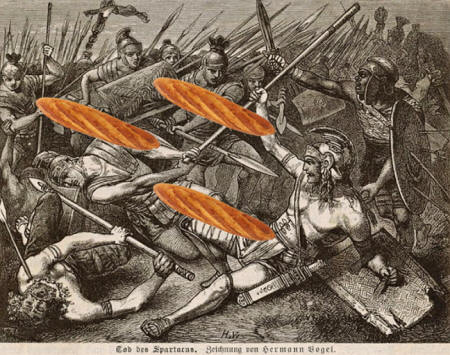|
Decimate is an interesting word, as far as wheat and gluten toxicity goes.
First of all, many who have been fortunate enough to have identified wheat's adverse health effects at the root of their often misdiagnosed health problems, know intimately that it is capable of decimating the health of their bodies.
Indeed, modern clinical research now confirms there are over 200 potential 'out of intestine' adverse health effects that can be linked to wheat consumption, which you can learn more about by reading: Wheat - 200 Clinically Confirmed Reasons Not To Eat It.
But the word decimate conceals a deeper historical connection with wheat that would not be apparent in its most widely used modern definition, provided below as definition #1.
In its everyday use, the word decimate is a synonym for destroy.
But the lesser known, second definition listed, "to select by lot and kill every tenth person of," is most revealing of its original ancient Roman meaning, where decimate originally referred to the killing of every tenth person, a punishment used in the Roman army for mutinous legions.
The Greek historian Plutarch (46-120 AD), described the process of decimation in his life of Antony.
After a defeat in Media:
When one considers the stark juxtaposition: on the one hand, punishment by bludgeoning; on the other hand, punishment by wheat deprivation, the dramatic contrast in severity (to us moderns) raises some obvious questions.
The answer to this question may lie in the profoundly addictive properties inherent within the form of wheat the Roman imperial empire spread across the ancient world, its legacy still permeating us, as Triticum aestivum (aka modern bread wheat) is the dominant form of wheat still used today in the Western world, and as Dr. William Davis has discussed extensively in his NY Times best-selling book Wheat Belly, the hybridized form we eat today has far higher levels of addictive gluten proteins.
In a previous essay titled, The Dark Side of Wheat, we explored modern bread wheat's biological and cultural dominance past and present, as a glorified grain both in the secular and religious senses.
We identified the Roman empire's use of wheat agriculture as a strategy, whose origins were either accidental or intentional, to convert conquered peoples into serfs, expanding their imperial reach and securing its dominance as a 'Wheat Empire.'
Wheat was even used as a means of controlling its own populace. In 140 B.C. Roman politicians devised a plan to rise to power by giving out free bread and entertainment, in what were known as "bread and circuses." They hoped this would win them votes.
As we discussed in The Dark Side of Wheat:
The Roman appreciation for wheat, like our own, may have had less to do with its nutritional value as 'health food' than its ability to generate a unique narcotic reaction.
It may fulfill our hunger while generating a repetitive, ceaseless cycle of craving more of the same, and by doing so, enabling the surreptitious control of human behavior. Other researchers have come to similar conclusions.
According to the Australian biologists Greg Wadley and Angus Martin:
Could wheat's addictive properties, particularly its opioid peptides, be the reason why sudden withdrawal of it from the diet could be considered a punishment on par with physical brutality?
Instead of getting bogged down with the question academically, my suggestion is to put theory into practice and to remove it entirely from your diet. Only then will you know if it has a hold on your mind and body, as you might experience significant withdrawal effects.
The proof may be in the gluten free pudding.
|

